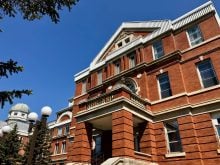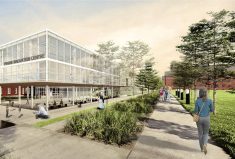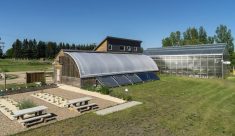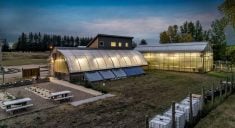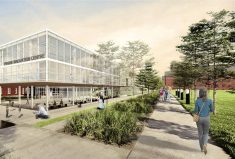“Education is what survives when what was learned has been forgotten.” (B.F. Skinner 1964, New Scientist, 21 May)
“(Education) has produced a vast population able to read, but unable to distinguish what is worth reading, an easy prey to sensations and cheap appeals.” (G.M. Trevelyan 1942, in English Social History)
Taken together, these quotes are pivotal to the type of educational systems we will need by 2050.
Education is not school, especially when dealing with the so-called “wicked” problems of growing population, war and conflict, diminishing extractable resources, social and environmental activism, fluctuating demographics, economic boom and bust, Internet-generated experts and critics, and the vagaries of climate change and weather instability.
Read Also

Mazergroup’s Bob Mazer dies
Mazergroup’s Bob Mazer, who helped grow his family’s company into a string of farm equipment dealerships and the main dealer for New Holland machinery in Saskatchewan and Manitoba, died July 6 from cancer.
Learning how to be adaptable and adaptive comes from a variety of inputs and situations, only some of which are found in the traditional classroom. In the rapidly changing world of today and tomorrow, access to “information” is instant and universal; the key question is how the validity of that information might be ascertained.
Will we need teachers to stand in front of a class and attempt to fill their students’ heads with presently known facts? Clearly this is not even necessary today, the student has multiple means of accessing “facts,” but few means to validate their relevance or accuracy, or to understand possible connections between apparently incongruent fields.
What is a student?
A student is not just the registered attendee of an educational institution who aims to gain a qualification, but anyone who is motivated to learn for whatever reason. When Wilhelm von Humboldt founded the University of Berlin in 1810, he set in train the beginnings of the type of university that we know today, one that links research to teaching, producing both innovations for industry and society, and knowledgeable people. Humboldt’s fundamental belief was that a university education was not defined by a teacher-student relationship, but rather that learning was a student-centred research activity guided by the professor.
A consequence of the interaction between the Humboldtian ideal and society over the last 200 years has been the continual creation of new research-driven academic disciplines. This, and the reductionism of parcelling knowledge into ever-narrower fields, has resulted in graduates from universities coming to know more and more about less and less, an almost inevitable consequence given the continual doubling of the total body of knowledge.
Another essential part of this 19th century model was the generation of new knowledge and its dissemination; if you needed to know you had to access knowledge within the university as part of that “community of scholars.”
But is this model still relevant to today’s needs, let alone those of the mid-21st century? For example, today’s agriculture students may learn about the two separated entities: the fate of pesticides in the environment from a course in soil or environmental science; and about weed or pathogen control from a plant scientist or pathologist. Would it not be more useful to deliver that knowledge in one integrated course?
Should not the teaching and learning offered by a university be relevant to the future needs of a student, rather than being based on the history of academic disciplines? And should it not provide the student with the analytical and synthesizing skills so that they can see connections and evaluate contradictions?
In their book Academically Adrift: Limited Learning on College Campuses, Richard Arum and Josipa Roksa report the results of their surveys of U.S. university and college students.
Lack of engagement
Their study showed that 45 per cent of college students do not gain in critical thinking, complex reasoning or writing skills during their four years as a student, less than 17 per cent of their time is spent in class or studying, over 29 per cent of graduates never or rarely read print or online news, and only 15 per cent discuss politics or public affairs daily (another 46 per cent on a weekly basis).
Students may be socially engaged, but they are not academically engaged, nor is a significant proportion gaining an understanding of the process of discovery, that is, learning how to learn.
In the 19th century change was dramatic and was viewed optimistically (at least by those whose voice was heard) as something that could have a positive effect on individuals and society. In the 21st century, change has come to be viewed as a potentially detrimental challenge, one that threatens our comfortable preconceptions: that receiving teaching equals accomplishments that become qualifications that guarantee a lifelong, well-paid job.
Those days are gone; perhaps they never actually existed.
To meet the challenges of the future, today’s young people need institutions and processes that help them develop into effective researchers, active and critical learners, and analytical thinkers, something for which our present educational institutions with their emphasis, or obsession, of testing for information retention, seem ill suited.
Whether it is for the nurturing of the young or all citizens, should we not give up our focus on validating qualifications for the convenience of employers, and concentrate instead on delivering that 19th century vision of simultaneous development of the individual and society through academic programs or outreach activities, that help the individual to learn how to learn: to populate society with analytical and critical researchers and thinkers, who can go on to become visionary leaders whose role will be to guide society successfully through the complex issues of the next 50 years?
For without knowledgeable, adaptable citizens and educated, visionary and ethical leaders, our future society must founder on the rocks of uncertain and rapid change.







